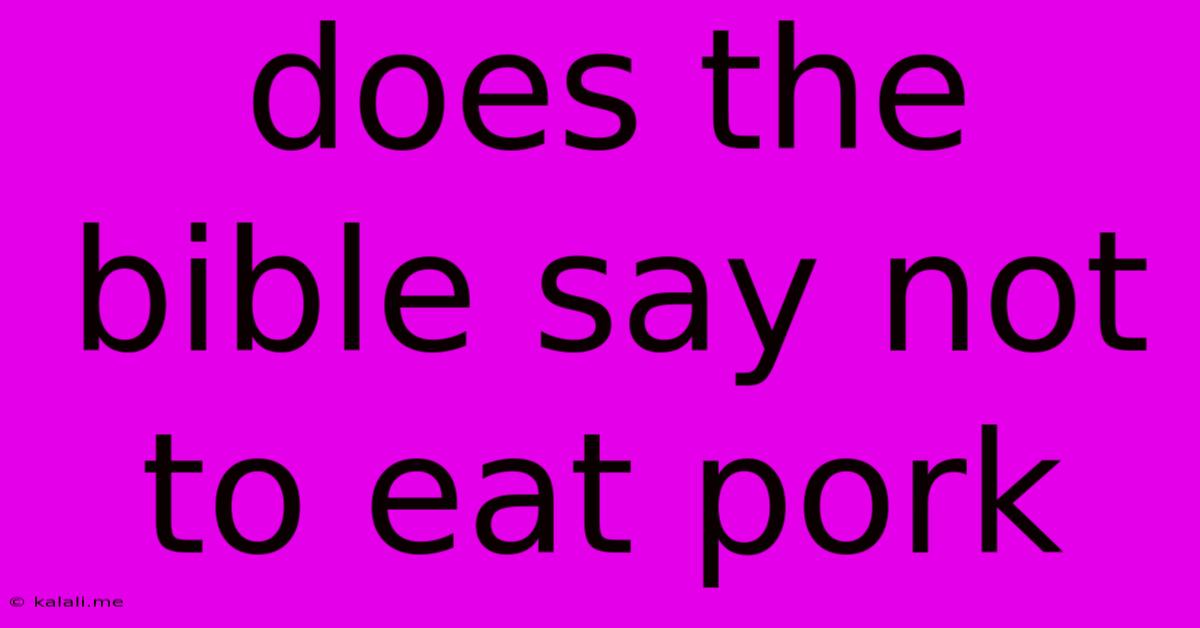Does The Bible Say Not To Eat Pork
Kalali
May 19, 2025 · 3 min read

Table of Contents
Does the Bible Say Not to Eat Pork? A Comprehensive Look at Leviticus and its Interpretations
The question of whether the Bible forbids eating pork is a common one, sparking debate among Christians and those interested in biblical dietary laws. The short answer is: yes, the Old Testament, specifically Leviticus, contains passages prohibiting the consumption of pork. However, the longer answer is far more nuanced and involves understanding the context, interpretations, and the shift in dietary laws within Christianity. This article will delve into the relevant scriptures, explore different perspectives, and provide a comprehensive understanding of this complex topic.
The primary source for the prohibition against pork is found in Leviticus 11:7-8: "And the swine, though he divide the hoof, and be cloven-footed, yet he cheweth not the cud; he is unclean to you. Of their flesh shall ye not eat, and their carcass shall ye not touch; they are unclean to you." This passage, along with other verses in Leviticus outlining "clean" and "unclean" animals, forms the basis of the kosher dietary laws observed by Judaism. These laws are part of a broader system of ritual purity emphasized in the Old Testament. The reasons behind these specific dietary restrictions are subject to much theological discussion, with explanations ranging from symbolic representations of holiness to practical concerns about food hygiene in ancient times. Further, Leviticus 11:27 lists several animals considered unclean that are also forbidden as food.
Why the Distinction Between Clean and Unclean Animals?
The distinction between "clean" and "unclean" animals in Leviticus is a complex issue with various interpretations. Some scholars suggest that the classifications were based on practical considerations of hygiene and food safety. Others see them as symbolic representations of holiness and separation from the surrounding pagan cultures. Still others emphasize the covenantal aspect, seeing these laws as a marker of the Israelites' unique relationship with God. Regardless of the precise reasoning, the prohibition against pork, along with other foods, was a significant aspect of Jewish life during the Old Testament period.
The New Testament Perspective: A Shift in Dietary Laws
The New Testament introduces a significant shift in the understanding of dietary laws. While the apostles initially adhered to some aspects of Jewish law, the writings of Paul, particularly in Acts 10 and 1 Corinthians 8, present a different perspective. These passages suggest that the dietary restrictions of the Old Testament are no longer binding on Christians. This change is often interpreted as representing a broader shift in focus from external ritual purity to internal spiritual purity. Paul’s emphasis on grace and salvation through faith in Christ transcends the strict adherence to specific dietary regulations outlined in the Old Testament. The focus shifts from adhering to specific rules to following Christ's teachings of love, compassion, and grace.
Conclusion: A Matter of Interpretation
In conclusion, while the Old Testament explicitly prohibits the consumption of pork, the New Testament introduces a significant shift in perspective regarding dietary laws. For many Christians, the dietary restrictions of Leviticus are no longer considered binding. The interpretation and application of these ancient laws continue to be a source of discussion and debate within Christianity, demonstrating the ongoing relevance of these scriptures in shaping faith and practice. Ultimately, whether or not an individual chooses to eat pork is a matter of personal conviction and interpretation within their own faith tradition.
Latest Posts
Latest Posts
-
Caught 3 Mice How Many More
May 19, 2025
-
How To Stop Condensation On Car Windows Overnight
May 19, 2025
-
Whats That Got To Do With The Price Of
May 19, 2025
-
How To Get Knots Out Of Hair
May 19, 2025
-
Offside Front Shock Absorbers Has Light Misting Of Oil
May 19, 2025
Related Post
Thank you for visiting our website which covers about Does The Bible Say Not To Eat Pork . We hope the information provided has been useful to you. Feel free to contact us if you have any questions or need further assistance. See you next time and don't miss to bookmark.